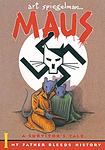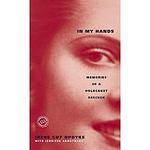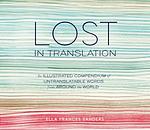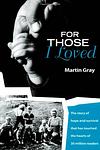The Greatest "Nonfiction, Poland" Books of All Time
Click to learn how this list is calculated.
This list represents a comprehensive and trusted collection of the greatest books. Developed through a specialized algorithm, it brings together 300 'best of' book lists to form a definitive guide to the world's most acclaimed books. For those interested in how these books are chosen, additional details can be found on the rankings page.
Genres
"Poland" as a category for books would encompass literature that is set in or about Poland, written by Polish authors, or explores Polish culture, history, and society. This category would include a wide range of genres, including historical fiction, memoirs, poetry, and non-fiction works that cover topics such as politics, art, and religion. Books in this category would provide readers with a deeper understanding of Poland's rich cultural heritage, complex history, and contemporary issues.
Countries
Date Range
Reading Statistics
Click the button below to see how many of these books you've read!
Download
If you're interested in downloading this list as a CSV file for use in a spreadsheet application, you can easily do so by clicking the button below. Please note that to ensure a manageable file size and faster download, the CSV will include details for only the first 500 books.
Download-
1. If This Is a Man by Primo Levi
This book is a deeply moving and insightful memoir of a survivor of Auschwitz, a Nazi concentration camp during World War II. The author, an Italian Jew, provides a detailed account of his life in the camp, the brutal conditions, the dehumanization, and the struggle for survival. The narrative is a profound exploration of the human spirit, resilience, and the will to live, despite unimaginable horror and suffering. It also raises profound questions about humanity, morality, and the capacity for evil.
-
2. Maus by Art Spiegelman
This graphic novel tells the story of a Holocaust survivor, as narrated by his son. The unique use of animals to represent different nationalities and ethnic groups adds a distinctive layer to the narrative. The protagonist's father recounts his experiences as a Polish Jew during World War II, offering a poignant depiction of the horrors of the Holocaust. The narrative also explores the complex father-son relationship, revealing the impact of such traumatic historical events on subsequent generations.
-
3. Man's Search for Meaning by Victor Frankl
This book is a memoir written by a psychiatrist who survived the Nazi concentration camps during World War II. The author shares his experiences in the camps and his psychological approach to surviving and finding meaning amidst extreme suffering. He introduces his theory of logotherapy, which suggests that life's primary motivational force is the search for meaning, and argues that even in the most absurd, painful, and dehumanized situation, life can be given meaning.
-
4. Schindler's List by Thomas Keneally
The book tells the true story of a German businessman who saves more than a thousand Polish Jews during the Holocaust by employing them in his factories. The protagonist's transformation from a greedy high living war profiteer to a savior of lives forms the crux of the narrative. It offers a chilling yet inspiring account of the horrors of the Holocaust, human resilience, and the power of one individual to make a significant difference.
-
5. Night by Elie Wiesel
This book is a memoir of the author's experiences during the Holocaust, specifically in the Auschwitz and Buchenwald concentration camps. The narrative focuses on the relationship between a father and son under the most extreme circumstances, the loss of faith in God, humanity, and in each other, and the horrifying reality of the systematic genocide of six million Jews during World War II. The book is a poignant and stark examination of the depths of human evil and the enduring power of hope and survival.
-
6. Promise at Dawn by Romain Gary
"Promise at Dawn" is a semi-autobiographical novel that explores the life of a young man growing up in Eastern Europe, and later in France, under the shadow of his ambitious and eccentric mother. The protagonist's journey takes him through various phases of his life from his childhood, through his experiences as a pilot in World War II, to his adult life as a diplomat and a writer. The story is a tribute to the protagonist's mother, who instilled in him the values of courage, resilience, and the pursuit of grandeur, even in the face of adversity.
-
7. On the Revolutions of the Heavenly Spheres by Nicolaus Copernicus
This book presents the revolutionary astronomical model that places the sun, rather than the earth, at the center of the universe. The author challenges the geocentric model of the cosmos, which had been widely accepted since the time of Aristotle, and instead proposes a heliocentric system, where the planets orbit the sun. This revolutionary idea transformed the way we understand our place in the universe, paving the way for modern astronomy and science.
-
8. The Captive Mind by Czesław Miłosz
"The Captive Mind" is a thought-provoking exploration of the intellectual and moral dilemmas faced by artists and intellectuals living under oppressive regimes. Through a series of powerful and insightful essays, the author delves into the psychological and ideological transformations experienced by individuals who compromise their values and conform to the demands of totalitarianism. With a blend of personal anecdotes, historical analysis, and philosophical reflections, this book offers a profound examination of the complexities of intellectual freedom and the power of ideology.
-
9. Schindler's Ark by Thomas Keneally
The book is a historical novel based on the true story of a German industrialist who becomes an unlikely humanitarian amid the barbaric Nazi reign. When he witnesses the horrors inflicted upon the Jews, he is moved to save as many as he can by employing them in his factory. His actions, driven by courage and compassion, lead to the salvation of over a thousand Jewish workers from certain death in the Holocaust. The narrative explores themes of morality, survival, and the capacity for good in the face of overwhelming evil, as the protagonist navigates the complexities of war and the human spirit.
-
10. The Drowned and the Saved by Primo Levi
This book is a deeply moving exploration of the Holocaust, written by a survivor. It delves into the horrifying experiences at Auschwitz, examining the psychological impact on the prisoners, the brutal behavior of the guards, and the complex moral dilemmas faced by both. The author also discusses the concept of memory and its unreliability, especially in the context of such traumatic events, and analyzes the ways in which the Holocaust has been represented and remembered in society. The book serves as a profound meditation on the human condition under extreme circumstances.
-
11. All But My Life by Gerda Weissmann Klein
"All But My Life" is a poignant memoir of a young woman's six-year ordeal as a victim of Nazi cruelty. The narrative follows her life from a peaceful, upper-middle-class childhood in Bielitz, Poland, through her horrifying experiences and loss during the Holocaust, to her miraculous survival and marriage to an American soldier. It is a story of courage, resilience, and the enduring power of hope.
-
12. Main Currents Of Marxism by Leszek Kolakowski
This comprehensive work is a critical analysis of the development and influence of Marxist thought throughout history. It delves into the origins of Marxist theory, tracing its evolution from the philosophical foundations laid by Karl Marx and Friedrich Engels, through various interpretations and schools of thought, including Leninism, Stalinism, and Trotskyism, up to its impact on political movements and intellectual debates in the 20th century. The author scrutinizes the theoretical underpinnings and practical applications of Marxism, exploring both its contributions to social science and its shortcomings, ultimately providing a thorough examination of its role in shaping modern political and economic landscapes.
-
13. Women In The Resistance And In The Holocaust by Vera Laska
This book provides a poignant and comprehensive historical account of the courageous roles played by women during one of history's darkest periods. It delves into the diverse and often overlooked contributions of female fighters, partisans, and activists who stood against the oppressive forces of the Nazi regime during World War II. Through personal narratives, testimonies, and documented events, the book highlights the resilience, bravery, and sacrifices of these women, who not only participated in the resistance movement but also endured the horrors of the Holocaust, offering a vital perspective on their indispensable role in the struggle for freedom and justice.
-
14. Madame Curie - A Biography by Eve Curie by Eve Curie
This biography provides an intimate and detailed account of the life of the renowned scientist, Madame Curie, who won the Nobel Prize twice for her groundbreaking work in Physics and Chemistry. It is written by her daughter, who offers a unique perspective on her mother's personal life, her struggles, her perseverance, and her monumental scientific achievements. The book also sheds light on Madame Curie's relationship with her husband Pierre, her life as a mother, and her role as a female pioneer in the male-dominated field of science.
-
15. The Emperor by Ryszard Kapuscinski
"The Emperor" is a non-fiction account of the final years of Haile Selassie's reign as the Emperor of Ethiopia. It is based on interviews with his former courtiers and officials, providing a unique and intimate portrayal of a regime marked by lavishness, intrigue, and corruption. This work also explores the dramatic events leading up to the Emperor's downfall and the Ethiopian revolution.
-
16. The Literary Work Of Art by Roman Ingarden
"The Literary Work of Art" is a philosophical exploration into the ontology of literature, examining how a literary work exists as a multilayered structure, comprising of sounds, meanings, and the phenomenological experiences they evoke. The book delves into the intricacies of how these layers interact to create a dynamic and immersive aesthetic object, which is both a creation of the author and an interpretation by the reader. Through a detailed analysis, the work discusses the role of ambiguity, intentionality, and the reader's involvement in actualizing a text, offering a comprehensive framework for understanding the complexity and richness of literary art.
-
17. I Have Lived a Thousand Years by Livia Bitton-Jackson
This memoir tells the harrowing story of a 13-year-old Jewish girl's survival during the Holocaust. The narrative follows her life from her quiet existence in Hungary through the horrors of Auschwitz and other concentration camps, and finally to her liberation and the struggle to rebuild her life in the aftermath of such trauma. The memoir is a powerful testament to human resilience and the will to survive against all odds.
-
18. 89 Poems by Zbigniew Herbert
"89 Poems" is a collection of profound and thought-provoking poems that explore various themes such as history, art, nature, and the human condition. Through his exquisite use of language and vivid imagery, the author invites readers on a journey of introspection and contemplation, delving into the complexities of existence and the timeless questions that define our humanity. With each poem, "89 Poems" offers a unique perspective on life, leaving readers with a renewed appreciation for the power of poetry to illuminate the world around us.
-
19. A World Apart by Gustaw Herling-Grudziński
"A World Apart" is a powerful memoir that recounts the author's experiences as a political prisoner in a Soviet labor camp during World War II. Through vivid and harrowing descriptions, the book exposes the brutality and inhumanity of the camp system, as well as the resilience and strength of the prisoners. It serves as a haunting reminder of the atrocities committed during this dark period of history and the enduring human spirit.
-
20. Alicia by Alicia Appleman-Jurman
The book is a harrowing memoir of a young Jewish girl's survival during the Holocaust. It recounts her life from a peaceful childhood in a small Polish town to the unspeakable horrors of Nazi occupation. As her family is decimated and her world is torn apart, she becomes a courageous messenger for the Jewish resistance, risking her life to help others while on a relentless quest for survival. Her story is one of remarkable resilience, hope, and the enduring strength of the human spirit in the face of unimaginable adversity.
-
21. In My Hands by Irene Opdyke
This memoir recounts the story of a Polish woman who, during World War II, worked as a housekeeper for a Nazi major while secretly aiding the Jewish resistance. She risked her life by hiding Jews in the basement of the Nazi officer's house, stealing food and supplies for them, and eventually leading them to safety. Despite the constant threat of discovery and the moral complexities she faced, she persevered in her efforts to save lives, demonstrating remarkable courage and resilience.
-
22. Lost In Translation by Eva Hoffman
"Lost in Translation" is a memoir that explores the profound complexities of identity and language through the lens of a young girl's emigration from Poland to Canada and then to the United States. The narrative delves into the emotional and psychological challenges of adapting to new cultures, the sense of displacement, and the search for belonging. It poignantly captures the experience of losing one's homeland and the struggle to assimilate while maintaining a connection to one's roots. The author reflects on the nuances of language and the deep connection between language and self, offering insights into the immigrant experience and the transformative power of embracing multiple worlds.
-
23. Survival In Auschwitz by Primo Levi
This book is a harrowing, first-person account of a man's year-long ordeal in Auschwitz, the infamous Nazi concentration camp. The narrative details the brutal conditions, the dehumanizing treatment, and the constant struggle for survival. Despite the horrors he faces, the author emphasizes the importance of maintaining one's humanity and dignity, even in the face of unimaginable cruelty. The book serves as a poignant reminder of the depths of human depravity, as well as the resilience of the human spirit.
-
24. Imperium by Ryszard Kapuscinski
"Imperium" is a gripping account of the author's travels through the Soviet Union during the final years of its existence. With a keen eye for detail and a deep understanding of the complexities of power, the author delves into the lives of ordinary people and high-ranking officials alike, revealing the oppressive nature of the Soviet regime and the profound impact it had on the lives of its citizens. Through vivid descriptions and insightful observations, the book offers a compelling narrative that sheds light on the inner workings of a crumbling empire.
-
25. For Those I Loved by Martin Gray
The book is a harrowing memoir of survival and resilience, chronicling the author's experiences during the Holocaust. As a young Jewish boy in Poland, he witnesses the brutal murder of his family by the Nazis and endures the horrors of the Warsaw Ghetto and Treblinka extermination camp. Against all odds, he manages to escape and join the resistance, fighting for freedom and justice. After the war, he rebuilds his life, only to face tragedy again when his wife and children are killed in a fire. The narrative is a testament to the human spirit's capacity to endure and find meaning in the face of unimaginable suffering.
Reading Statistics
Click the button below to see how many of these books you've read!
Download
If you're interested in downloading this list as a CSV file for use in a spreadsheet application, you can easily do so by clicking the button below. Please note that to ensure a manageable file size and faster download, the CSV will include details for only the first 500 books.
Download





















